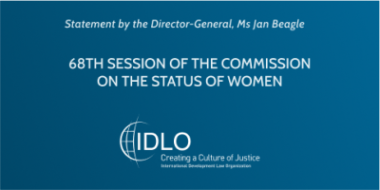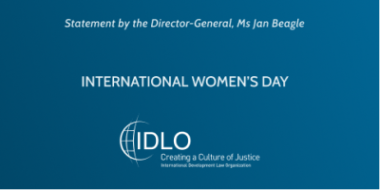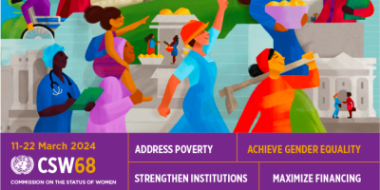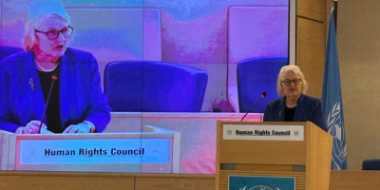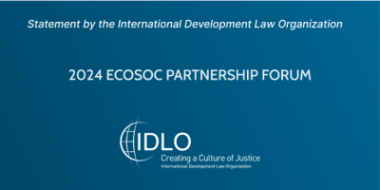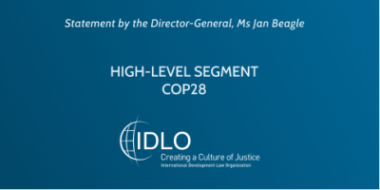Justice Albie Sachs, former judge on South Africa’s Constitutional Court and current member of IDLO’s International Advisory Council, has spent his lifetime fighting for freedom and equality. After being driven into exile for his opposition to Apartheid and then the target of a car bomb attack, Justice Sachs only became more devoted to the cause of justice. Upon his return to South Africa, he spearheaded landmark cases and drafted a new democratic Constitution for the country based on the principles of non-discrimination, inclusion and dignity.
During the Global Conference on SDG 16, IDLO spoke to Justice Sachs about his life’s work, which embodies the spirit of Sustainable Development Goal 16: to achieve peaceful, just and inclusive societies, leaving no one behind.
Question: When we talk about realizing the Sustainable Development Goals at times it can seem as if we are talking about an impossible utopia. The ideals of Goal 16 are inspirational but the journey to realizing them is difficult. As someone who has seen both progress and setbacks for the rule of law, what are your thoughts on this pursuit? And what will it take to reach these ideals?
Answer: Well, in South Africa we are very good at doing the impossible. The miraculous thing is that we're not so good at doing the ordinary. The idea that one day black and white South Africans could live together in dignity, peace and equality, seemed completely unimaginable after 300 years of oppression, dispossession and warfare. A disenfranchised black majority driven off the land, we thought: how can we possibly live together?
It was the Constitution and the process of making the Constitution that enabled us to live together in peace and in dignity, and to have a Constitution that promotes transformation and change.
We have just had our 6th general election – peaceful, free and fair. A president stepped down even before their full two terms. Not because of tanks in the streets or a million people in the square, but because we have agreed on a Constitution. So law, constitutionalism, dignity and equality - these impossible dreams - actually made our country possible.
Now we have to use those themes to make our country not only possible but more equal, fairer and more just.
The most wonderful part for me wasn't even the Conference. It was seeing the people walking in and seeing people from Africa, Asia, northern Europe and Latin America. And I thought: isn't it marvelous that people have united from all over the world to have more justice, more fairness, more equality. They are coming together and thinking of practical, sustainable ways to do it. I feel very at home and I feel very happy to make our little contribution.
Law, constitutionalism, dignity and equality - these impossible dreams - actually made our country possible.
Q: You have seen and been involved in extraordinary waves of change, particularly in South Africa. What are some lessons that can be drawn for people around the world who may be fighting their own battles for peace, justice and freedom?
A: Well, often in South Africa we felt very isolated and very far away. And sadly, racist ideas and the Cold War enabled a very oppressive regime to hang on for much longer than was necessary. But we always reached out to the world. We always found there were struggles around the world and there were people from different communities - from the labor movement, or the faith communities, from the women's movement, internationalists - a variety of people who said this is unjust, this is unfair, this is wrong.
In particular, they took up the issues with their own governments and their own companies benefiting from Apartheid. In that way, solidarity was established. The people in other countries they are fighting for your rights, they're fighting for their dignity and for their countries not to be involved in exploitation, domination and injustice.
Today, South Africa now has an honorable place in the world. We contribute in many ways in terms of our Truth and Reconciliation Commission, which is a source of enormous interest for the whole world. We have a Constitution that speaks about non-sexism as well as non-racialism. We have social and economic rights in our Constitution, with a very independent judiciary. We are giving back to the world and feeding from the world at the same time, as a dignified nation and as a part of the community of nations.
Q: Thinking about what it takes to realize the ideals of Goal 16, and knowing what it took in South Africa, what or who do you see as the main agents of change to bring these Goals forward?
In the world, some voices are much louder than others. One of the objects of this whole gathering, and all the people involved in this, is to allow the voices that are not being heard of people who are often suffering the most pain. Those who are being left behind, who most need the benefits of the law, who most need to have more opportunities and possibilities and self-expression - to allow them to come into the picture.
So, it's not just a question of human rights activists fighting on behalf of the oppressed, poor people of the world. Or even picking up a gun and fighting a liberation struggle through violence which often leads to counter-violence.
The objective is to enable marginalized, oppressed people to feel dignified in themselves, to feel important and that they matter, and that their voices count. To think that they feel part of the change and to feel empowered even if their life circumstances are difficult. I see all these programs that in one way or another, are directed towards that objective.
And the advantage of the poor speaking in their own name, in their own voice is not simply a matter of a right to justice. It is a matter of self-esteem, dignity and justice, and you also get better solutions.
Then, you become part of the solution and more of a citizen. Because your life is not subject to fate and destiny in the control of others, you are participating in a national, regional and international project to improve conditions in life.
The objective is to enable marginalized, oppressed people to feel dignified in themselves, to feel important and that they matter, and that their voices count.


